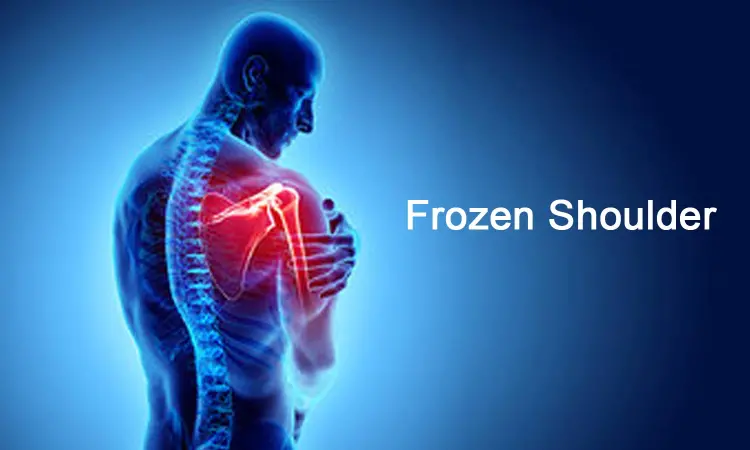- Home
- Medical news & Guidelines
- Anesthesiology
- Cardiology and CTVS
- Critical Care
- Dentistry
- Dermatology
- Diabetes and Endocrinology
- ENT
- Gastroenterology
- Medicine
- Nephrology
- Neurology
- Obstretics-Gynaecology
- Oncology
- Ophthalmology
- Orthopaedics
- Pediatrics-Neonatology
- Psychiatry
- Pulmonology
- Radiology
- Surgery
- Urology
- Laboratory Medicine
- Diet
- Nursing
- Paramedical
- Physiotherapy
- Health news
- Fact Check
- Bone Health Fact Check
- Brain Health Fact Check
- Cancer Related Fact Check
- Child Care Fact Check
- Dental and oral health fact check
- Diabetes and metabolic health fact check
- Diet and Nutrition Fact Check
- Eye and ENT Care Fact Check
- Fitness fact check
- Gut health fact check
- Heart health fact check
- Kidney health fact check
- Medical education fact check
- Men's health fact check
- Respiratory fact check
- Skin and hair care fact check
- Vaccine and Immunization fact check
- Women's health fact check
- AYUSH
- State News
- Andaman and Nicobar Islands
- Andhra Pradesh
- Arunachal Pradesh
- Assam
- Bihar
- Chandigarh
- Chattisgarh
- Dadra and Nagar Haveli
- Daman and Diu
- Delhi
- Goa
- Gujarat
- Haryana
- Himachal Pradesh
- Jammu & Kashmir
- Jharkhand
- Karnataka
- Kerala
- Ladakh
- Lakshadweep
- Madhya Pradesh
- Maharashtra
- Manipur
- Meghalaya
- Mizoram
- Nagaland
- Odisha
- Puducherry
- Punjab
- Rajasthan
- Sikkim
- Tamil Nadu
- Telangana
- Tripura
- Uttar Pradesh
- Uttrakhand
- West Bengal
- Medical Education
- Industry
Even Normal fasting blood sugar significantly linked to Frozen shoulder: Study

High blood sugar or Hyperglycemia is the most commonly cited risk factor for frozen shoulder. However, no study has established whether fasting blood sugar levels within the normoglycemic range are associated with idiopathic adhesive capsulitis (IAC) or frozen shoulder.
Dr Hyung BinPark along with his panel of researchers have reported a significant association of fasting blood sugar levels within normal range with development of frozen shoulder.
The study has been recently published in the Journal of Shoulder and Elbow Surgery.
This study hypothesized that increments of fasting blood sugar levels within the normoglycemic range would be linked to frozen shoulder. This study investigated any association between normoglycemic fasting blood sugar levels and frozen shoulder.
Adhesive capsulitis ,commonly known as frozen shoulder occurs when ligaments around the shoulder joint swell and become stiff. Previous research has shown that people with poorly controlled diabetic patients are up to twice prone to suffer from frozen shoulder.
The current study investigated the association between normoglycemic fasting blood sugar levels and IAC, if any. The study design was a case control one comprising of a group of 151 patients with IAC without other risk factors whereas the control subjects had normal shoulder function. Both the groups had a non contributory past medical history. The sample was divided into 4 categories i.e. <85, 85-89, 90-94, and 95-99 mg/dL depending on the fasting glucose levels. Researchers further assessed multiple co-variables like body mass index, serum lipid profiles, thyroid hormone levels, fasting blood sugar levels, glycosylated hemoglobin A1c, and high-sensitivity C-reactive protein.
Findings of the study brought forth the following facts.
- Fasting glucose levels in the 90-94 mg/dL quartile (which are currently considered normoglycemic) or higher were significantly positively associated with IAC (P ≤ .034).
- Higher cholesterol levels and high-sensitivity C-reactive protein were significantly associated with IAC (P ≤ .030).
- A negative relation was noted between patients with fasting glucose levels below 85 mg/dL and IAC.
Though many studies have associated IAC with hyperglycemia,this study is the first to analyse the relation of frozen shoulder in a normoglycemic population.
The significantly high positive correlation of frozen shoulder in people within normal blood sugar levels points out that other risk factors need to be further evaluated in future studies, the researchers opined.
Journal-
Journal of Shoulder and Elbow Surgery.
Read the full article on: https://doi.org/10.1016/j.jse.2020.03.017
Dr Satabdi Saha (BDS, MDS) is a practicing pediatric dentist with a keen interest in new medical researches and updates. She has completed her BDS from North Bengal Dental College ,Darjeeling. Then she went on to secure an ALL INDIA NEET PG rank and completed her MDS from the first dental college in the country – Dr R. Ahmed Dental College and Hospital. She is currently attached to The Marwari Relief Society Hospital as a consultant along with private practice of 2 years. She has published scientific papers in national and international journals. Her strong passion of sharing knowledge with the medical fraternity has motivated her to be a part of Medical Dialogues.
Dr Kamal Kant Kohli-MBBS, DTCD- a chest specialist with more than 30 years of practice and a flair for writing clinical articles, Dr Kamal Kant Kohli joined Medical Dialogues as a Chief Editor of Medical News. Besides writing articles, as an editor, he proofreads and verifies all the medical content published on Medical Dialogues including those coming from journals, studies,medical conferences,guidelines etc. Email: drkohli@medicaldialogues.in. Contact no. 011-43720751


